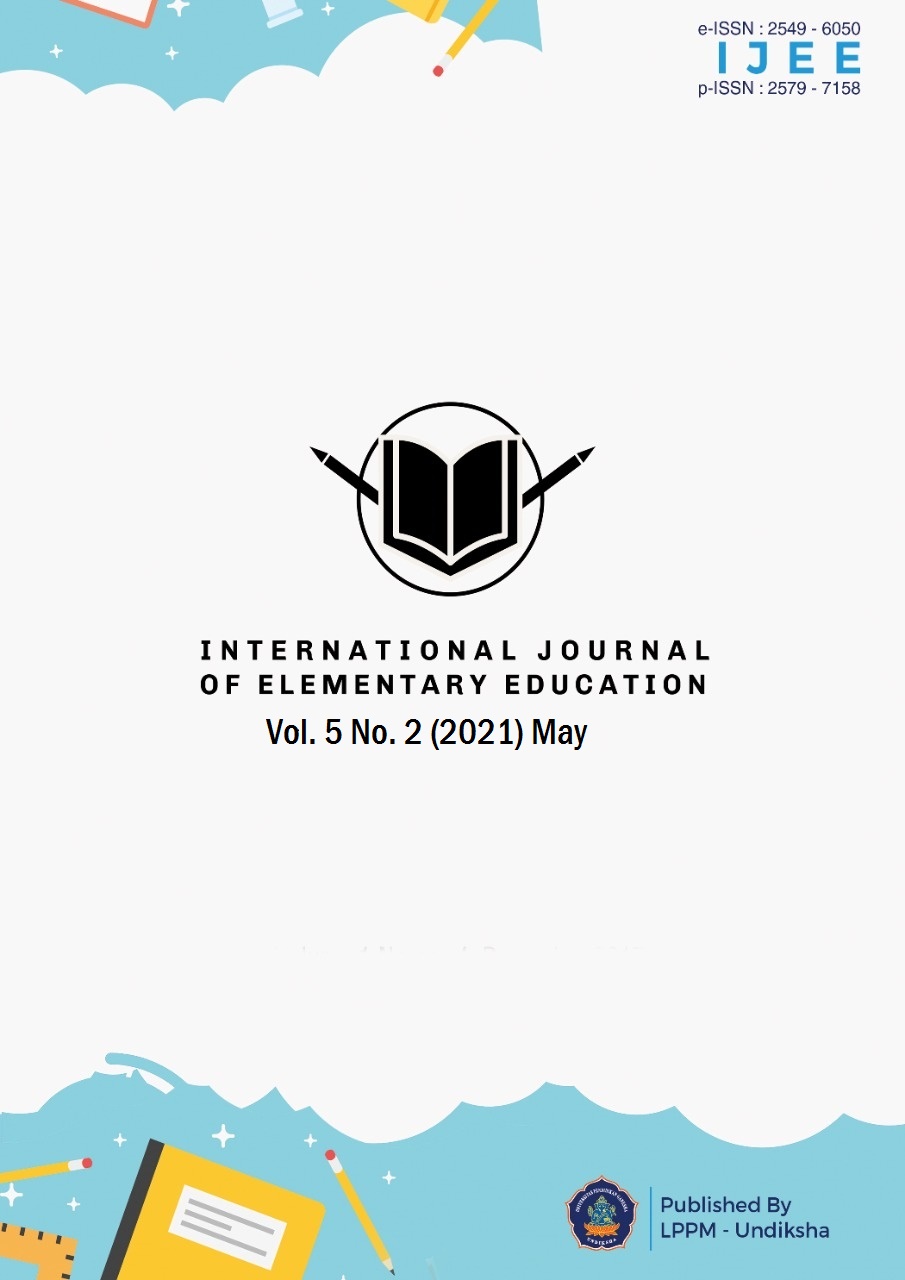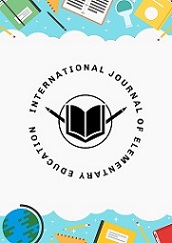The Effectiveness of Problem Based Learning-Based Interactive Multimedia for Elementary School Students
DOI:
https://doi.org/10.23887/ijee.v5i2.31603Kata Kunci:
educational tecnology, learning media, interactive multimedia, problem based learningAbstrak
Learning activities carried out online have several drawbacks. In online learning activities, teachers experience problems carrying out learning activities. These obstacles include the lack of appropriate media to be used in learning activities. The problems that occur indicate that in learning activities students have difficulty in understanding learning materials and learning motivation is still low. Therefore, in learning activities, teachers must prepare quality learning. One of the efforts that can be done to overcome these problems is through the use of appropriate learning media. So that it can improve the process and better learning outcomes. This study uses a research and development (R&D) approach. The purpose of this research is to develop learning technology in the form of interactive multimedia based on problem-based learning. The steps used in this research and development is the ADDIE development model. The research data was obtained through a media validation sheet instrument by an expert. Data analysis was carried out quantitatively descriptively. The results of the media feasibility test based on the validation results obtained a value of 80%. Based on the results of the research that has been done, it can be concluded that interactive multimedia based on problem-based learning is feasible to be used in learning activities. The results of this study imply that the use of interactive multimedia based on problem-based learning plays an important role in the effectiveness of learning activities.
Referensi
Adedoyin, O. B., & Soykan, E. (2020). Covid-19 pandemic and online learning: the challenges and opportunities. Interactive Learning Environments, 0(0), 1–13. https://doi.org/10.1080/10494820.2020.1813180.
Balim, A. G., Inel-Ekici, D., & Ozcan, E. (2016). Concept Cartoons Supported Problem based learning Method in Middle School Science Classrooms. Journal of Education and Learning, 5(2), 272. https://doi.org/10.5539/jel.v5n2p272.
Bayrak, R., & Gürses, A. (2020). Teaching of the subject of solids through problem-based learning approach. World Journal of Education, 10(3), 47. https://doi.org/10.5430/wje.v10n3p47.
Dağgöl, G. D. (2020). Perceived academic motivation and learner empowerment levels of efl students in Turkish context. Participatory Educational Research, 7(3), 21–37. https://doi.org/10.17275/per.20.33.7.3.
Das, K. (2019). Role of ICT for better Mathematics Teaching. Shanlax International Journal of Education, 7(4), 19–28. https://doi.org/10.34293/education.v7i4.641.
Ditta, A. S., Strickland-Hughes, C. M., Cheung, C., & Wu, R. (2020). Exposure to information increases motivation to learn more. Learning and Motivation, 72(July). https://doi.org/10.1016/j.lmot.2020.101668.
Dong, C., Cao, S., & Li, H. (2020). Young children’s online learning during COVID-19 pandemic: Chinese parents’ beliefs and attitudes. Children and Youth Services Review, 118(June), 105440. https://doi.org/10.1016/j.childyouth.2020.105440.
Essel, H. B., Osei-poku, P., & Opoku-asare, N. A. (2016). Self-Paced Interactive Multimedia Courseware: A Learning Support Resource for Enhancing Electronic Theses and Dissertations Development. Journal of Education and Practice, 7(12), 74–84.
Fikri, H., & Madona, A. S. (2018). Pengembangan Media Pembelajaran Berbasis Multimedia Interaktif. Samudra Biru.
Hobbs, R. (2013). Improvization and strategic risk-taking in informal learning with digital media literacy. Learning, Media and Technology, 38(2), 182–197. https://doi.org/10.1080/17439884.2013.756517.
Kanoksilapatham, B., Khamkhien, A., Kitkha, P., & Na Nongkhai, A. O. (2021). Motivation of thai university students from two disciplinary backgrounds using a hybrid questionnaire. LEARN Journal: Language Education and Acquisition Research Network, 14(1), 455–491.
Kim, J. (2020). Learning and teaching online during Covid-19: Experiences of student teachers in an early childhood education practicum. International Journal of Early Childhood, 52(2), 145–158. https://doi.org/10.1007/s13158-020-00272-6.
Kılıç, M. E. (2021). Motivation in the classroom. Participatory Educational Research (PER), 8(April), 31–56. https://doi.org/10.17275/per.21.28.8.2.
Lapuz, A. M., & Fulgencio, M. (2020). Improving the critical thinking skills of secondary school students using problem-based learning. International Journal of Academic Multidisciplinary Research (IJAMR), 4(1), 1–7. https://files.eric.ed.gov/fulltext/ED603182.pdf.
Lara, S. O. V. (2020). Academic performance of students of urban design, applying problem-based learning (PBL). Journal of Problem Based Learning in Higher Education, 8(1), 63–71. https://doi.org/10.5278/ojs.jpblhe.v8i1.2640.
Leow, F. T., & Neo, M. (2014). Interactive multimedia learning: Innovating classroom education in a Malaysian University. Turkish Online Journal of Educational Technology, 13(2), 99–110.
Mukni’ah. (2021). Analysis study: the ability of literation of islamic religious education students reviewed from implementing group investigation model and learning motivation. Elementary Education Online, 20(5), 59–66. https://doi.org/10.17051/ilkonline.2021.05.06.
Namiroh, S., Sumantri, M. S., & Situmorang, R. (2018). Peran multimedia dalam pembelajaran. Prosiding Seminar Dan Diskusi Nasional Pendidikan Dasar, 352–357. http://journal.unj.ac.id/unj/index.php/psdpd/article/view/10161.
Nguyen, N.-G. (2020). Using the Problem-Based Learning in STEM Teaching About Bamboo Toothpick Houses. International Education Studies, 13(12), 70. https://doi.org/10.5539/ies.v13n12p70.
Onyema, E. M. (2020). Impact of Coronavirus Pandemic on Education. Journal of Education and Practice, 11(13), 108–121. https://doi.org/10.7176/jep/11-13-12.
Özdemir, O., & Öner, İ. E. (2015). The Effects of Simulations and Animations on Students’ Motivation in a Computer Course. Participatory Educational Research, 15(2), 53–59. https://doi.org/10.17275/per.15.spi.2.7.
Partovi, T., & Razavi, M. R. (2019). The effect of game-based learning on academic achievement motivation of elementary school students. Learning and Motivation, 68(June). https://doi.org/10.1016/j.lmot.2019.101592.
Prasetyo, G., & Prasojo, L. D. (2016). Pengembangan adobe flash pada pembelajaran tematik-integratif berbasis scientific approach subtema indahnya peninggalan sejarah. Jurnal Prima Edukasia, 4(1), 54. https://doi.org/10.21831/jpe.v4i1.7788.
Prawiyogi, A. G., Purwanugraha, A., Fakhry, G., & Firmansyah, M. (2020). Efektifitas Pembelajaran Jarak Jauh Terhadap Pembelajaran Siswa di SDIT Cendekia Purwakarta. Jurnal Pendidikan Dasar, 11(01), 94–101.
Pribowo, F. S. P. (2020). Persepsi Guru SD Muhammadiyah Terhadap Penggunaan Gawai Dalam Pembelajaran Di Kelas. Literasi Dalam Pendidikan Di Era Digital Untuk Generasi Milenial, 209–219.
Rahayu, R. P., & Wirza, Y. (2020). Teachers’ perception of online learning during pandemic covid-19. Jurnal Penelitian Pendidikan, 20(3), 392–406. https://doi.org/10.17509/jpp.v20i3.29226.
Ratminingsih, N. M. (2016). Efektivitas media audio pembelajaran bahasa inggris berbasis lagu kreasi di kelas lima sekolah dasar. JPI (Jurnal Pendidikan Indonesia), 5(1), 27–38. https://doi.org/10.23887/jpi-undiksha.v5i1.8292.
Rillero, P., & Chen, Y.-C. (2019). The use of a digital problem-based learning module in science methods courses. Journal of Problem Based Learning in Higher Education, 7(1), 107–119. https://doi.org/10.5278/ojs.jpblhe.v7i1.2349.
Saptenno, A. E., Tuaputty, H., Rumahlatu, D., & Papilaya, P. M. (2019). The improvement of learning motivation and creative thinking skills of senior high school students through modified problem based learning model. Journal for the Education of Gifted Young Scientists, 7(4), 1175–1194. https://doi.org/10.17478/jegys.597519.
Saripudin, E., Sari, I. J., & Mukhtar, M. (2018). Using Macro Flash Animation Media on Motion Material to Improve Learning Achievement for Learning Science in Junior High School. Jurnal Penelitian Dan Pembelajaran IPA, 4(1), 68–75. https://doi.org/10.30870/jppi.v4i1.3316.
Sholihah, A. N. N., Septiani, I., Rejekiningsih, T., Triyanto, & Rusnaini. (2020). Development of interactive multimedia learning courseware to strengthen students’ character. European Journal of Educational Research, 9(3), 1267–1279. https://doi.org/10.12973/eu-jer.9.3.1267.
Simanjuntak, S. Y., Dwimawanti, I. H., & Hidayatullah, M. A. (2020). Respons Guru Terhadap Kebijakan Pembelajaran Jarak Jauh Selama Pandemi Covid-19. Jurnal Ilmiah Pendidikan Citra Bakti, 7(2), 125–136.
Srimulyani, V., & Hermanto, Y. (2021). Online Learning During the Covid-19 Pandemic (Study at Several Schools and University in Indonesia). Jurnal Pendidikan Dan Pengajaran, 54(1). https://doi.org/10.23887/jpp.v54i1.29703.
Sugiyono. (2017). Metodologi Penelitian Pendidikan. Rineka Cipta.
Susilawati, S., Jamaluddin, J., & Bachtiar, I. (2017). Pengaruh model pembelajaran berbasis masalah (pbm) berbantuan multimedia terhadap kemampuan berpikir kritis peserta didik kelas vii smp negeri 2 mataram ditinjau dari kemampuan akademik. Jurnal Pijar Mipa, 12(2), 64–70. https://doi.org/10.29303/jpm.v12i2.343.
Tegeh, I. M., & Kirna, I. M. (2013). Pengembangan Bahan Ajar Metode Penelitian Pendidikan Dengan Addie Model. Jurnal Ikatan Alumni (IKA) Universitas Pendidikan Ganesha, 11(1). https://doi.org/10.23887/ika.v11i1.1145.
Uzun, A., Onur, A., & Alabay, S. (2020). Students’ views on database management systems course designed according to problem-based learning. International Journal of Evaluation and Research in Education, 9(1), 177–187. https://doi.org/10.11591/ijere.v9i1.20501.
Widyatmojo, G., & Muhtadi, A. (2017). Pengembangan multimedia pembelajaran interaktif berbentuk game untuk menstimulasi aspek kognitif dan bahasa. Jurnal Inovasi Teknologi Pendidikan, 4(1), 38–49. https://doi.org/10.21831/jitp.v4i1.10194.
Zainiyati, H. S. (2017). Pengembangan media pembelajaran berbasis ICT: konsep dan aplikasi pada pembelajaran pendidikan agama islam. Kencana.
Unduhan
Diterbitkan
Cara Mengutip
Terbitan
Bagian
Lisensi
Authors who publish with the International Journal of Elementary Education agree to the following terms:
- Authors retain copyright and grant the journal the right of first publication with the work simultaneously licensed under a Creative Commons Attribution License (CC BY-SA 4.0) that allows others to share the work with an acknowledgment of the work's authorship and initial publication in this journal.
- Authors are able to enter into separate, additional contractual arrangements for the non-exclusive distribution of the journal's published version of the work (e.g., post it to an institutional repository or publish it in a book), with an acknowledgment of its initial publication in this journal.
- Authors are permitted and encouraged to post their work online (e.g., in institutional repositories or on their website) prior to and during the submission process, as it can lead to productive exchanges, as well as earlier and greater citation of published work. (See The Effect of Open Access)










